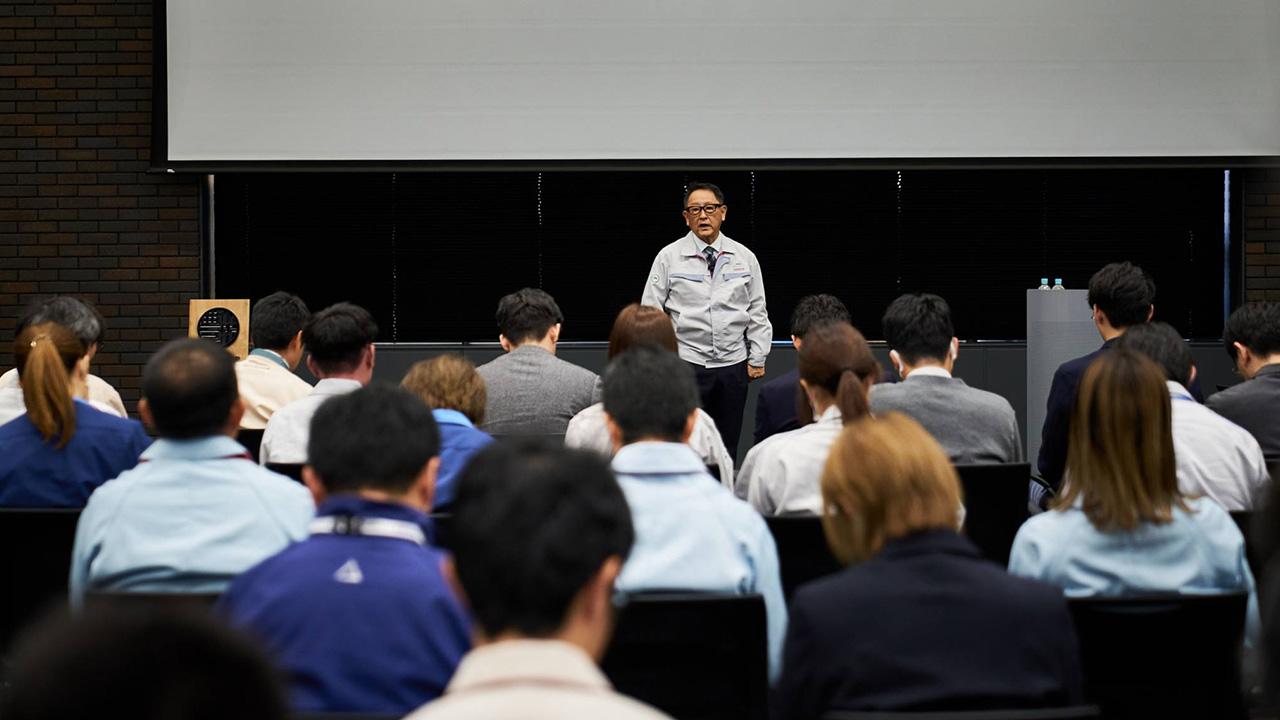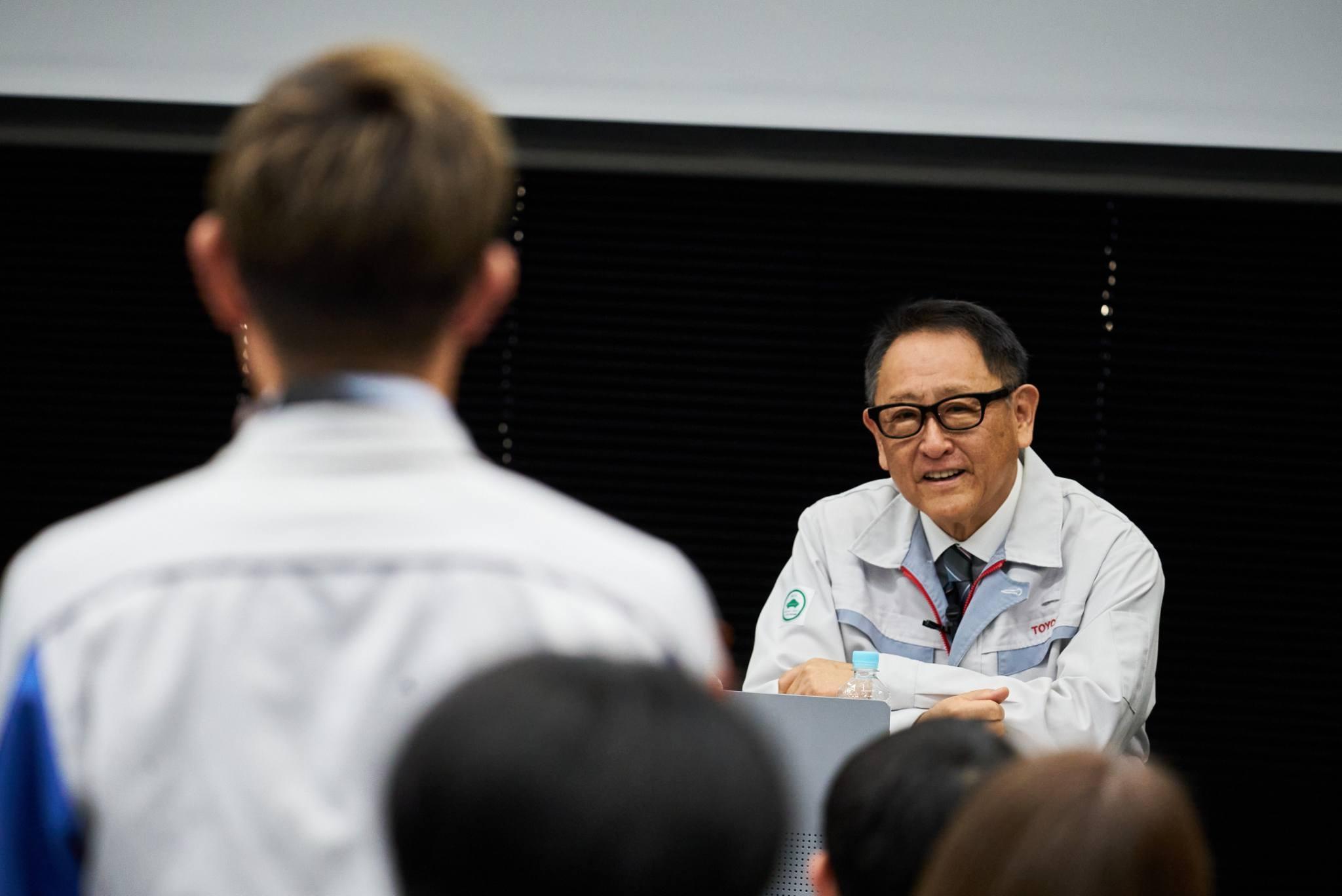
Toyota Group genba leaders, selected by roles rather than titles, gathered for a candid dialogue with Chairman Akio Toyoda, who has vowed to take responsibility and "lead the transformation."
Advice for those caught in the middle
Many frontline leaders find themselves between the genba and management, or the Group and partner companies. What advice would you give those who feel they are being pulled in two directions?
Chairman Toyoda
Very simply, what do you want to do?
While organizations and corporate visions serve as a necessary compass, you move the ship. So please ask yourself, “What kind of person do I want to be? What do I want to do? What makes me happy?”
I think that mid-level leaders often lose sight of themselves, but we should try to act in ways that would be praised by our future, more grown-up selves. Even if no one else appreciates this, it helps to establish our own core.
Organizational and corporate policies are set by the powers of that time and might change from year to year, right? You can’t let yourself be tossed around by them.
Being part of a company means following certain rules. But when it comes to the question of what to do, ask your heart. Starting today, try living your life that way—it may change how you see things.
Dealing with loneliness
Japan once had a culture of seppuku, in which death was a way of taking responsibility. However, you provide these opportunities because you believe that to take responsibility truly, we must carry on. Meanwhile, you often talk about a sense of isolation, which can sometimes breed animosity. Given these pressures, are you sometimes conflicted about opening up? Please share how you deal with this situation.
Chairman Toyoda

That’s a difficult question (laughs). Rather than falling on your sword, I think you need to show the right way to live.
Personally, people saw me as not being up to the task. As president, I was told to “hurry up and quit to take responsibility for the company’s poor performance.” Without mincing words, I wanted to prove the naysayers wrong.
But time and again, you lose heart. It’s lonely work.
When that happens, who do you allow to dictate your world: a handful of detractors or those who silently support how you lead your life?
I think what I do is slightly unusual and strays from convention, yet many people get behind me.
This includes the Morizo fans I meet at motorsport events, as well as the growing number of people who show appreciation for Toyota’s products.
Given Morizo’s popularity and our strong products right now, I need to unite the Toyota Group under a shared mindset. We need to produce many leaders whom the public entrusts to build a future together, and I see this as my job.
Having said that, feeling isolated is tough. In those times, you need a place where you can be by yourself, and friends. Company colleagues won’t do it because they’re generally self-centered (laughs). You need friends who have nothing to do with the company.
Helping subordinates find their way
Some of those I oversee tell me they don’t know what they want to do and can’t do a job without answers. I have been doing what I can to counsel them, but it’s tough… How can I help people find what they want to do?
Chairman Toyoda
First, abandon the manager’s perspective and engage person to person. Take an interest in them, and they will take an interest in you.
People may say they have nothing to do, but we all live our 24 hours each day. Take an interest in what they do on the weekends. What do they enjoy about it? Ask them to tell you more.
Every person is sure to have things they are good at and things they like. Even sleeping is a hobby for some people.
Then ask: “How many hours do you sleep?” “Really, 10 hours?” “Do you dream?” “How do you manage to sleep so long?” I think that’s a start. When you’re asking as part of work, they say, “I don’t have anything to do.”
The other aspect is not having an interest in their work. In that case, you must make the job enjoyable.
We spend most of those 24 hours at work. I don’t think anyone has the right to force this on others as simply “a job.”
More importantly, you need to draw out what is appealing, such that you yourself find it interesting. I urge you to drop the manager’s perspective and show that you are interested—if you do that, I think things will change.


